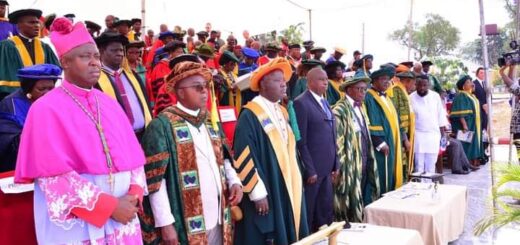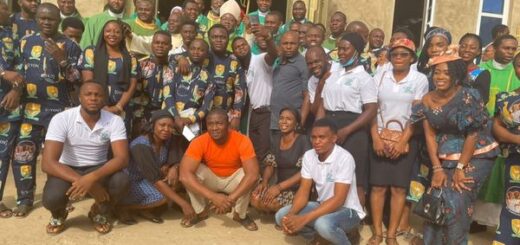Rethinking Interfaith, Cultural, Ecumenical and Religious Dialogue In Nigeria’s Pluralistic Context
by ARCH BISHOP · May 12, 2022
Keynote Address by Most Rev. Ignatius A. Kaigama, Archbishop of Abuja, at the Maiden National Conference on Interreligious Dialogue, on “Rethinking Interfaith, Cultural, Ecumenical and Religious Dialogue In Nigeria’s Pluralistic Context,” Held at Veritas University, Abuja, 12th May, 2022.
Protocols:
Your Exellencies,
The Vice Chancellor (Fr. Prof. Hyacinth Ichoku),
Veritas University Management Staff,
The Convener of this Conference (Fr. Prof. Michael Udoekpo),
Our Distinguished Guest Speakers from different Faith Traditions,
All Invitees, Participants,
Members of the Press,
Ladies and Gentlemen,
PREAMBLE
I wish to thank the convener of this forum, Fr. Prof. Michael Udoekpo, and his collaborators, for the gracious invitation to give a keynote address during this laudable Maiden National Conference on Interfaith and Religious Dialogue in Veritas University, Abuja, whose theme is: “Rethinking Interfaith, Ecumenical, Cultural and Religious Dialogue in a pluralistic Nigeria.” It is a great honour to be with you here.
The idea of making the entire world a neighborhood is gradually being achieved by science and technology. It is easy today for persons in different parts of the world to relate as if they are in the same neighborhood, thanks to visual and digital communications. More so, travel around the world has also been made easy and fast, thanks to air transportation. Money can be transferred from place to place at the press of a button. The world has indeed become a global village.
Something more needs to be done however: the task of making this neighborhood a brotherhood. Part of our reason for gathering here today is to deliberate on fostering brotherhood among different peoples that make up our society. We must find a way of creating a brotherhood out of our diversity for a harmonious and peaceful co-existence. Fratelli Tutti is a loud and clear call by Pope Francis, to brotherhood and sisterhood; the Catholic Bishops of Nigeria and only a few days ago the Bishops of the Reunion of the Episcopal Conferences of West Africa were re-echoing the same call. We are represented here today by speakers from different faith traditions and this is holding in Veritas University whose primary mission includes “dialogue and collaboration in human relationships at various levels and among various cultures and religions….” (Ex corde Ecclesiae, nos. 31-37).
Merely co-habiting or coexisting or tolerating one another is not enough. We must learn to love genuinely, forgive wholeheartedly and embrace warmly, counting the interests of others higher than ours (cf. Phil. 2).
RELIGION AND HUMAN BROTHERHOOD
From the Bible we read the beautiful creation story of Adam and Eve our first parents from whom all other humans came (cf. Gen. 1 and 2). The same story is repeated in the Quran with an emphasis that Allah created all humanity from the same stock (cf. Q. Al-Anʽām 6:98). That being the case we ought to see ourselves as sisters and brothers. The accidental differences that exist among us due to culture, habitat, religion, etc. should not be strong enough as to annul the natural likeness that we have with one another.
John Paul II became the first Pope to visit the Jewish Synagogue in Rome on April 16, 1986. Second, he presided over an inter-faith prayer for peace in Assisi on October 26, 1986. Through these two gestures and many others, the Holy Father became a friend to everyone, Jews, non-Jews and many non–Catholics. He became a role model for moral leadership in pluralistic world context in searching for a more peaceful and harmonious global village.
On 4th February, 2019, Pope Francis and Sheikh Al-Azhar (Ahmad Tayyib) jointly signed in Abu Dhabi (United Arab Emirates) “A Document on Human Fraternity for world Peace and Living Together”. We have more in common than where we differ. The Catholic Church teaches that: “We cannot truly pray to God the father of all if we treat any people in other than brotherly fashion for all men are created in God’s image” (Nostra Aetate no. 5).
NIGERIA A PLURALISTIC SOCIETY
Nigeria has been described as a nation of nations. Made up of over 450 ethnic groups, the different ethnic groups had a semi-independent existence until the British creation of the country called Nigeria in the 20th century. Three main religions predominate in Nigeria: African Traditional Religions (ATR), Islam and Christianity coexist. Within these religions also, there are denominational diversity. ATR in Igboland is not the same with that of Yorubaland neither is it the same with Hausaland. In Islam we have the Sunni, the Shia, the Ahmadiyya etc. The Christian religion is a plethora of denominations like Catholic, Anglican, Methodist and all forms of Evangelical and Pentecostal groups. This is evident in the number of “churches” and “worship” centers we find on our streets, and yet peace, morality, security, good governance as well as ecumenical and interfaith harmony are still elusive. Despite many leaders’ claim to religiosity, they become the ostrich when they face governance issues of health care; the need for functional, stable, qualitative and affordable education system that should be the bedrock of development and center for meaningful dialogue, etc.
Nigeria has been indeed a pluralistic society right from its inception. And therefore, while accepting that we have become one country, we also need to accept that we are a nation of nations. This will help us to fashion out a unique model of government and life that will accommodate each and every group.
IMPORTANCE OF DIALOGUE
The era of constant battle is over and the era of dialogue and consensus has been established. In their socio-political philosophies, Thomas Hobbes (1588-1679) and John Locke (1632-1704) explained the distaste that humans had for the violence and chaos that characterized prior state of affairs. This made them to decide on the formation of a civil society based on consensus and agreements.
The common origin and destination of all humanity should impel us to know our co-travelers on the journey. Pope Paul VI refers to this as ‘Dialogue of Salvation’ (cf. Ecclesiam Suam no. 70). A journey made with a friend is shorter and more enjoyable than that made with an enemy. Dialogue is incumbent on us for justice and fairness to all.
We all know that peace is never achieved in a battlefield but on the table of dialogue. When the battle is over, we return to the table of discussion. So why not avoid the former and go directly to the latter. It saves time, energy, lives, and resources.
RETHINKING DIALOGUE IN NIGERIA
Not even in Saudi Arabia nor in Italy can we maintain a myth of homogenous religious affiliation. The effort of Boko Haram for instance to make northern Nigeria an Islamic domain is not only a very tall order but also an affront on the God who allowed human diversity. We must make room for every form of human diversity. For this reason, rethinking the concept of dialogue in Nigeria and giving it a prime position cannot but be done now. Cases of Christians fighting Christians or Muslims fighting Muslims would not exist when we consider the option of dialogue.
BLESSED ARE THE PEACEMAKERS
At his sermon on the mount, Jesus Christ singled out the pacemakers: Blessed are the peace makers, for they shall be called children of God (cf. Matt. 5:9). What this implies is that anyone who is not on the path of peace can hardly be called a child of God no matter how he/she frequents the temple, the church, the mosque or any other religious place. Etymologically, the term ‘religion’ is derived from the Latin religio which means bond or obligation. It thus refers to the bond between the creator and the creature. Going back to the verbal form of the word, religare, it means to tie again. i.e. tie tight. Religion is therefore a process of reconnecting humanity tightly to their creator.
It was the Indian sage, Mahatma Ghandi who once said: “The day the power of love overrules the love of power, the world will know peace.” We pray that Russia and Ukraine will experience this sooner than later.
DIALOGUE IN THE WAY OF CONFLICT RESOLUTION AND PEACE
There can be no good management of diversity without the knowledge of one another, and there can be no knowledge of one another without coming together. The table of dialogue is where peace is shared. It gives opportunity for people to air their grievances and explain the misconceptions about others. If this is sincerely done, our diversity will not snowball into crises or conflicts.
LEARNING TO LIVE IN PEACE
Dialogue of life is living and interacting with people of other faith and understanding that there is another view or religion. The religious extremist would say no to dialogue of life. This is why they would call for Muslims alone or Christians alone to live in a particular section of the country or city. They would advocate for Muslims alone to go to Muslim schools and Christians alone to go to Christian schools. But can they also maintain a Muslim-alone road or Christian-alone market? Religious crisis results from exclusivism. It is a situation where a believer feels that his own faith is the one true faith and others have no basis or worse still, to apply such derogatory terms as infidels or unbelievers.
CONCLUSION: LESSONS TO BE LEARNT
Dialogue has the extreme capacity to do what the bombs, guns, deadly arrows, spears and vicious early morning or late night attacks cannot resolve.
The historical composition of Nigeria, its amalgamation, military rules, etc have created problems that must be objectively analyzed and dispassionately resolved.
Nigeria with its history of misunderstanding, uncertainties and deliberate attempts to distort history, facts about population, everyone playing the victim, must see genuine dialogue as condition sine qua non.
Ethnic and religious hypersensitivity must yield to rational analysis of issues, common values and love of our country (patriotism).
Unnecessary competition of religious interests, superiority or numerical advantage, pose great challenges to harmony. Polarization occurs. Prejudices, stereotypes become the order of the day. Instead of religion building us up, it is eating us up and disfiguring our national identity and crippling national progress.
I wish to conclude with these two commendable examples: We were invited to visit the “House of One” project, where efforts are being made in Berlin, Germany, for “Jews, Christians and Muslims” to work together to build a structure that will house a Synagogue, a Church and a Mosque under one roof. It will be a “house of prayer” and interdisciplinary teaching; a place of encounter, for meeting and exchange among people of different faiths… a house for all of those who do not belong to a religious community.” I hope we can conceive something like this in Nigeria.
In Köln, we joined the Muslims in the beautiful “Cologne Central Mosque” (the architect of the Mosque is a Christian). The Emir of Wase in Plateau State, Mohammed Sambo Haruna, and I got a great warm welcome and a gift of the Koran each. This was followed by a lovely meal with the Mosque officials and the members of our delegation, (as was the case in the hall of the Mosque in Essen). While the Friday prayer was going on in the Mosque, we, the few non-Muslims sat behind the worshippers to wait for them to conclude (I was quietly saying my rosary).
We must endeavour to affirm and respect what is good and true in all religious traditions, as God wants all to be saved (cf. 1 Tim. 2:4).
May God grant success to the work of our hands and may our deliberation today bear lasting fruits. Thank you.




